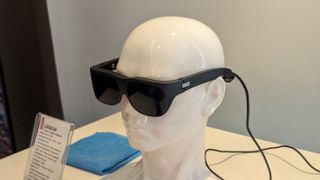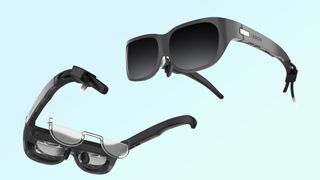Review sản phẩm
Trải nghiệm tay trên kính Lenovo Legion — Cuối cùng, chơi game AR mà tôi thực sự muốn tham gia
Giới thiệu Lenovo Legion Glasses hands-on — finally AR gaming I can get behind
Lenovo Legion Glasses – Trải nghiệm thực tế tăng cường – cuối cùng tôi đã tìm được trò chơi AR phù hợp.
#LenovoLegionGlasses – trải nghiệm thực tế tuyệt vời về trò chơi AR
Đánh giá sản phẩm và mua ngay tại Queen Mobile!
🔍 Bạn đang tìm kiếm một ấn tượng mới trong lĩnh vực trò chơi thực tế tăng cường (AR)? Lenovo Legion Glasses chính là sự lựa chọn hoàn hảo dành cho bạn!
👓 Với việc trang bị công nghệ AR tiên tiến, đôi kính này mang đến cho người dùng một trải nghiệm trò chơi AR chưa từng có. Bạn sẽ được chìm đắm trong một thế giới ảo hoàn toàn mới, nơi hiện thực và ảo hòa quyện một cách tuyệt vời.
🎮 Lenovo Legion Glasses được thiết kế tinh tế và sang trọng. Chất liệu chắc chắn và nhẹ nhàng giúp bạn thoải mái sử dụng trong thời gian dài mà không gây cảm giác khó chịu.
💪 Đặc điểm nổi bật của Lenovo Legion Glasses là khả năng tương thích vượt trội với các thiết bị di động, máy tính bảng và máy tính xách tay. Bạn có thể dễ dàng kết nối với các nền tảng khác nhau và trải nghiệm trò chơi AR tuyệt vời ngay trên màn hình kính của mình.
💥 Sự kết hợp của thế giới thực và các yếu tố ảo tạo nên một trò chơi độc đáo và hấp dẫn. Bạn có thể tận hưởng trò chơi bắn súng hợp tác, tham gia vào cuộc kỳ ngộ giữa thế giới thực và thế giới AR, hoặc thậm chí hòa mình vào một trận đấu bóng đá ảo cực kỳ sống động.
🛒 Để sở hữu ngay Lenovo Legion Glasses và trải nghiệm những trò chơi AR độc đáo, hãy đến tại Queen Mobile ngay hôm nay. Cửa hàng chúng tôi cam kết cung cấp sản phẩm chính hãng và dịch vụ hỗ trợ tốt nhất cho mọi khách hàng.
#QueenMobile #Lenovo #LegionGlasses #tròchơiAR #thực tếtăngcường #ARgaming
Mua ngay sản phẩm tại Việt Nam:
QUEEN MOBILE chuyên cung cấp điện thoại Iphone, máy tính bảng Ipad, đồng hồ Smartwatch và các phụ kiện APPLE và các giải pháp điện tử và nhà thông minh. Queen Mobile rất hân hạnh được phục vụ quý khách….
_____________________________________________________
Mua #Điện_thoại #iphone #ipad #macbook #samsung #xiaomi #poco #oppo #snapdragon giá tốt, hãy ghé [𝑸𝑼𝑬𝑬𝑵 𝑴𝑶𝑩𝑰𝑳𝑬]
✿ 149 Hòa Bình, phường Hiệp Tân, quận Tân Phú, TP HCM
✿ 402B, Hai Bà Trưng, P Tân Định, Q 1, HCM
✿ 287 đường 3/2 P 10, Q 10, HCM
Hotline (miễn phí) 19003190
Thu cũ đổi mới
Rẻ hơn hoàn tiền
Góp 0%
Thời gian làm việc: 9h – 21h.
KẾT LUẬN
Trong đoạn tóm tắt này, Lenovo Legion Glasses được giới thiệu là một sản phẩm kích thích người mua nhờ tính năng thực tại tăng cường (AR) trong lĩnh vực game. Sản phẩm được mô tả là một cách tiếp cận độc đáo và tạo độ hứng thú cho người chơi, với khả năng tạo ra một trải nghiệm AR chân thực và sử dụng tay để tương tác trong game. Điều này mang lại trải nghiệm mới mẻ và hấp dẫn trong việc khám phá thế giới ảo thông qua hiệu ứng lớn và phản ứng nhanh. Với Lenovo Legion Glasses, người dùng có thể trải nghiệm AR gaming một cách tốt hơn và tận hưởng những lợi ích mà công nghệ này mang lại.
Gaming on the go is easier than ever, especially with the recent wave of Nintendo Switch-style handheld gaming PCs. The trade-off is that those devices don’t have particularly big screens, and you’re not getting the same experience you’d get sitting in front of a TV or monitor. But does it have to be that way?
Lenovo clearly doesn’t think so, and that means a pair of augmented reality glasses are launching alongside Lenovo Legion Go handheld and Lenovo Legion 9i gaming laptop. The Lenovo Legion Glasses are there for all those times that your usual display just can’t cut it.
The glasses sound impressive on paper, but how enjoyable are they to use? I got to try the glasses for myself at IFA 2023, and I can tell you now that I’m pretty impressed with what they can do — especially compared to previous Lenovo AR headsets.
What are the Lenovo Legion Glasses?

As the name suggests, the Lenovo Legion Glasses are a pair of glasses that function as an external monitor for devices that support screen pass through for augmented reality glasses. The main focus is the Lenovo Legion Go and Legion 9i, but you’re not necessarily restricted to using those two devices.
Plug in and you’re met with the equivalent of a 27-inch monitor, capable of displaying content at 60Hz and 1080p per eye. The display uses a microLED panel, too, which means the quality is pretty high, even if it’s not quite as good as the screens on both new Legion devices.
It’s a heck of a lot more convenient than carrying around a giant monitor. The glasses plug into a USB-C port, and feature built-in speakers, sound and brightness controls, as well as a button to “unpin” the virtual screen from your direct line of sight.
The Legion Glasses go on sale in October, at the same time as the Legion Go, and will set you back $329.
The Legion Glasses offer AR I actually enjoy

During my time with the Legion Glasses I was able to use them with both of Lenovo’s newest gaming machines to varying degrees of effectiveness. The Legion Go was able to recognize the headset as soon as I plugged in, instantly mirroring the screen in front of my eyes.
It’s rather weird that at home I don’t have the energy to wash my car, but when the prospect of cleaning a virtual van was available I was more than happy to take part.
The Legion 9i wasn’t quite so willing to play ball. But since Windows 11 recognises the glasses as a separate monitor, it didn’t take long to figure out the laptop was extending its screen rather than mirroring it.
The key thing to note about the Legion Glasses is that they are essentially a bulky pair of glasses. This isn’t a headset, akin to the bulky Lenovo Mirage AR headset from a few years back. This is something sleeker and potentially more useful.
But these are not the long-fabled AR glasses big tech is striving towards. They are bulkier than an ordinary pair of specs, and they block your direct line of sight — leaving only your periphery open to the outside world. You couldn’t walk around in these very easily, and it’s probably not worth trying.
They are surprisingly comfortable, though. Despite the bulk and the 4-foot USB-C cable, it’s rather easy to get lost in your game, which was Power Washing Simulator in this instance.
It’s rather weird that at home I don’t have the energy to power wash my car, but when the prospect of cleaning a virtual van was available I was more than happy to take part.
The quality of the picture was surprisingly good as well. There’s no obvious pixelation, no doubt thanks to the mini-LEDs in the display, and there didn’t appear to be any noticeable latency. Not that Power Washing Simulator is the kind of fast-paced game that relies on ultra-fast reaction times.
The Legion Glasses aren’t all perfect

The only real complaint I have is that the Legion Glasses suffer one key drawback that I regularly encounter with VR headsets. It’s difficult to describe, but I guess the best way is as a “tingle” around the top of my sinuses. My best explanation is that it’s a combination of weight, and the sensation of sitting too close to the TV screen.
It’s not uncomfortable, by any means, just a weird feeling that can take you out of the experience if you’re not too careful. Then again, this is the kind of thing that isn’t likely to go away anytime soon, and I’m just going to have to get used to this.
Thankfully ,the other VR pitfalls were completely absent. That includes motion sickness, which will be down to the fact the screen is completely static, and the headaches a bunch of people typically experience with a closed-off virtual reality device.
You also need to be aware that the picture quality on the glasses is not as good as that on the Legion Go or the Legion 9i — despite the illusion of a larger screen size. Its resolution is limited to 1080p per eye, and the refresh rate tops out at 60Hz.
The Legion Go offers QHD+ resolution at 144Hz, while the Legion 9i is 3.2K resolution at up to 165Hz. So that’s a pretty big difference, and may be a dealbreaker for some hardcore videophiles.
The Glasses don’t have their own power supply either, and draw their energy from whatever device they’re plugged into. According to Lenovo they only use 2W of power, but over extended periods of time that will impact your battery life.
The Legion Glasses future could go beyond gaming

The Legion Glasses are far from Lenovo’s first foray into the augmented reality market, but it’s possible that this might be the attempt that actually sticks. Why? Because this time compatibility is on Lenovo’s side.
Just think back to the Mirage AR headset, which first launched back in 2017. Functionally, the headset was pretty good. Prone to fogging up in my poorly-heated ex-apartment, but fun to play and functionally rather an impressive piece of kit. It just never really got much attention beyond the initial hype and faded into obscurity pretty quickly.
The problem with the Mirage was that it relied on bespoke software, which needed to be made for the headset and its controllers. Beyond two examples that I can remember, which were Star Wars and Marvel-themed, that software never came. And what good is a headset with two games? Certainly not worth paying $250 for.
The Legion Glasses suggest that Lenovo has learned from those mistakes. This isn’t a $329 product that only works with one or two things; it’s a product that works with Windows and every single game or piece of software you can get running on your machine. Better still, Lenovo says the glasses will work with any device that supports augmented reality, including Android and iOS.
So while the Legion Go and Legion 9i may be the launching pad for the Legion Glasses, they won’t be necessary for its success.
Whether the glasses will be a success is another matter entirely. $329 is a lot of money, especially for something as niche as AR, but at least this time there are a heck of a lot more reasons to pick up a pair.
More from Tom’s Guide
Xem chi tiết và đăng kýXem chi tiết và đăng ký
Khám phá thêm từ Phụ Kiện Đỉnh
Đăng ký để nhận các bài đăng mới nhất được gửi đến email của bạn.





